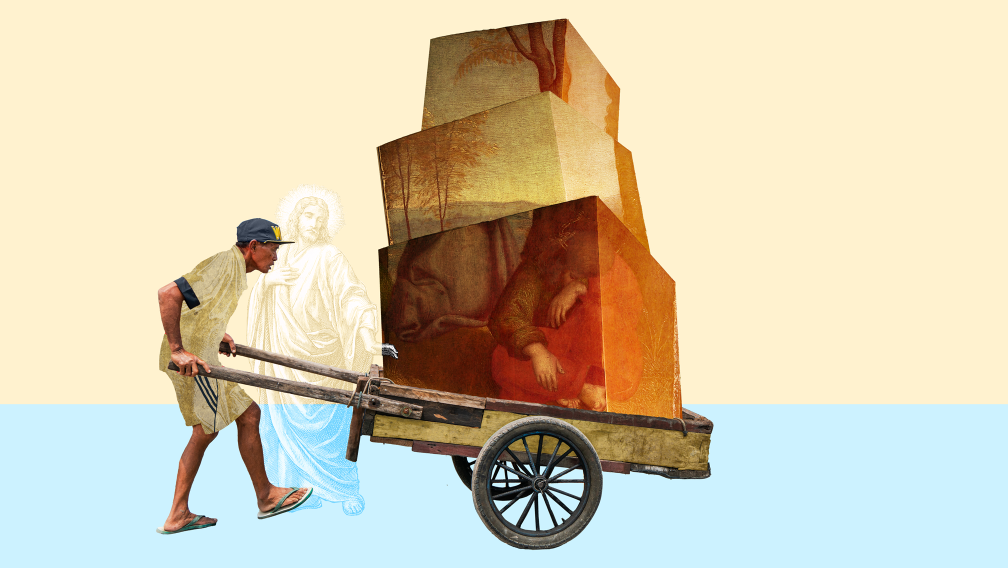Acknowledging Our Limits

“For you have been my help, and in the shadow of your wings I sing for joy.” — Psalm 63:7
Psalm 63 is born of distress. It’s ascribed to David, the shepherd boy and eventual king, during one of his several wilderness wanderings — perhaps evading his erstwhile mentor King Saul’s pursuit or later, after taking the throne, fleeing a coup staged by his own son Absalom. In either case, adversity has left the writer exhausted and desperate, spiritually as well as physically. It’s all the more striking, then, that David, God’s chosen warrior king, should invite us to reflect on a remarkable metaphor: God as a bird under whose wings we might take refuge.
Certainly, other deities besides Israel’s were depicted with wings. There were even winged figures in the temple in Jerusalem. And we may be familiar with the image of the Holy Spirit descending on Jesus in the form of a dove. But Scripture and tradition give us two more bird analogies to help us understand God — and ourselves.
In last Sunday’s Gospel reading, Jesus looks out at Jerusalem with compassion and compares himself to a mother hen trying to gather her chicks under her wings. On its face, this looks like a direct continuation of Psalm 63; Jesus wants to give the same comfort the psalmist recalls and desires. Yet the point in the Gospel is exactly the opposite: Jerusalem refuses the comfort Jesus offers. It’s less about the protectiveness of the mother hen and more about the unruliness of her chicks.
We need reminders, even as we repeatedly choose to wander in wildernesses of our own making, that Jesus desires to gather us under his care.”
It’s a fitting image for our Lenten observance today, when our 40 days in the metaphorical wilderness might look more like Israel’s years of wandering than Jesus’s discipline in the desert. Often, in our own times of desperation, we choose what’s familiar, the perceived safety of control, over the enduring security of surrender to God’s motherly protection. But just because we fail to recognize our need — that we can’t do this all on our own — doesn’t mean we need God any less.
One extraordinary depiction of this need is another bird, one that comes to us from tradition. Historical artwork of Jesus as a mother hen is almost nonexistent. Instead, if you look for bird imagery for Jesus, you are much more likely to find another, rather unusual bird: the pelican.
People once believed that pelicans care so much for their children that, if no other food is available, the mother will pierce her own breast to feed her young with her blood. It’s a gruesome myth that has clear parallels to Jesus’s no-less-gruesome piercing on the cross. In contrast to the mother hen’s unruly chicks, in Christian depictions of pelicans, the young are crowded around their mother. These chicks know their need, and that points them to their source of sustenance and true safety. So, too, if we acknowledge our need, the pelican points us past Lent to God’s self-giving love shown to us on Good Friday and Easter.
Hens and pelicans. Both are conjured by Psalm 63’s avian imagery, and we need both their lessons. We need reminders, even as we repeatedly choose to wander in wildernesses of our own making, that Jesus desires to gather us under his care. The Lenten journey helps us recognize and face our own limits. Yet the journey must not be confused with the destination. The pelican reminds us where this is headed: toward a pierced savior whose love is given freely to the whole world. When we see what it costs to gather us unruly chicks, only then will we truly sing Easter songs of joy under the shadow of God’s wings.
Patrick Haley
Patrick is a post-doctorate fellow at Trinity Church NYC and Princeton Theological Seminary.
Read all of Sunday’s Scriptures
Step Into the Story
Here are some ways to think about how God cares for us.
Music
In the hymn “Jesus, Lover of My Soul,” Charles Wesley writes of the refuge we find in God and asks Jesus to “cover my defenseless head with the shadow of thy wing.”
Poetry
“The world is charged with the grandeur of God,” writes priest and poet Gerard Manley Hopkins. And despite our ongoing abuse of the earth’s resources, “morning, at the brown brink eastward, springs — / Because the Holy Ghost over the bent / World broods with warm breast and with ah! bright wings.” God is faithful, even when we’re not.
Visual Art
The Dominus Flevit Church on the Mount of Olives, the place where Jesus looked out over Jerusalem, features a mosaic of the mother hen on its altar.
Theology
United Methodist pastor Jennifer Williams reflects on the sacredness of motherhood and medieval mystic Julian of Norwich’s daring image of Jesus as our mother. “[T]his woman who wrote about God almost 700 years ago . . . has provided a space outside of dominant male metaphors for Christians to feel seen, understood, and deeply loved,” Williams writes. “It is a reminder that our experiences of God are valid.”





